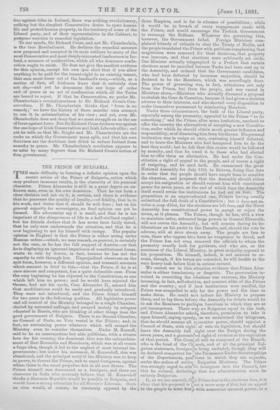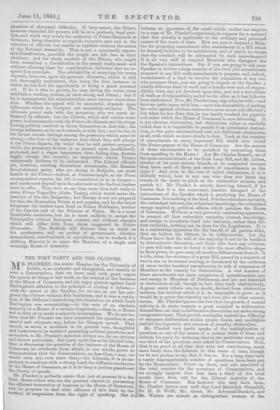THE PRINCE OF BULGARIA.
THE main difficulty in forming a definite opinion upon the recent action of the Prince of Bulgaria, action which may produce immense results, is the obscurity of his personal character. Prince Alexander is still in a great degree an un- known man, even in his own dominion. That he can form a clear decision and act on it, is certain, and there is evidence that he possesses the quality of loyalty,‚ÄĒof fidelity, that is, to ;his work, and desire that it should be well done ; but on his general capacity for sovereignty, no final opinion can yet be formed. His adversaries say it is small, and that he is too impatient of the desagreinens of life in a half-civilised capital ; 'but his friends declare that it has never been fairly tested, that he only now understands the situation, and that he is now beginning to act for himself with energy. The popular opinion in England is that the Prince is either acting under 'Russian orders‚ÄĒwhich, we may remark, en passant, is certainly not the case, as he has the full support of Austria‚ÄĒor that he is displaying an ignorant impatience of constitutional forms, wants to ‚ÄĘ rule by decree, in fact, because he has not the capacity to rule through law. Unprejudiced observers on the spot form, however, a different opinion, and transmit accounts which amount in brief to this,---that the Prince, if he is at once sincere and competent, has a quite defensible case. From the very beginning he has objected to the Constitution, as one which left him no power ; and he would have rejected the 'throne, had not his uncle, Czar Alexander II,, assured him that modifications could be easily and gradually introduced. They were not introduced, and the Prince found himself for twe years in the following position. All legislative power and all control of the Ministry belonged to a single Chamber, elected by universal suffrage,' and swayed mainly by refugees educated in Russia, who are thinking of other things than the good government of Bulgaria. There is no Second Chamber, mo Council of State, no Veto vested in the Prince ; and, in fact, no restraining power whatever which will compel the Ministry even to consider themselves. Under M. Zancoff, said to be an unscrupulous but able politician, with a sincere love for his country, the dominant idea was the enfranchise- ment of East Roumelia and Macedonia, which was at all events a largo idea, though it led to the neglect of most internal im- provements ; but under his successor, M. Karaveloff, this was abandoned, and the principal motifof the Ministry was to keep rin power, to thwart the Prince, and to expel foreigners, against whom there is the usual prejudice felt in all new States. The Prince himself was denounced as a foreigner, and there are observers in Sofia who seriously believe that M. Karaveloff thinks a Slavonia Republic would be possible in Bulgaria, and would have a strong attraction for all Slavonic Liberals. Such an idea would, of course, be resolutely opposed by the
three Empires, and is far in advance of possibilities ; while it would be in breach of every engagement made with the Prince, and would encourage the Turkish Government to reoccupy the Balkans. Whatever the governing idea, however, the Government failed. Foreign Ministers com- plained bitterly of refusals to obey the Treaty of Berlin, and the people inundated the Prince with petitions complaining that magistrates were removed for their decisions, that property was insecure, and that elections were arbitrarily set aside. One Minister actually telegraphed to a Prefect that certain elections must be annulled because Turks had been sent up to the Assembly, and ordered that the Government candidates, who had been defeated by immense majorities, should be declared to be the Members, which was accordingly done. Tho power of governing was, in fact, withdrawn not only from the Prince, but from the people, and was vested in Ministers alone,‚ÄĒMinisters who actually discussed a proposal to abolish the Cour de Cessation, because it had given a decision adverse to their interests, and who showed every disposition to make themselves permanent by nominating Members. Under these circumstances, the bulk of the Liberal party, especially among the peasantry, appealed to the Prince " to do something ;" and the Prince, after some hesitation, resolved to offer the country the alternatives of accepting a new Constitu- tion, under which he should obtain much greater influence and responsibility, or of dismissing him from his throne. His personal inclination was to resign at once, confessing himself defeated, and to leave the Ministers who had hampered him to do the best they could ; but he felt that this course would be followed by anarchy, and that he owed it to those who had elected him to offer them an alternative. He had under the Con- stitution a right of appeal to the people, and of course a right of resigning, and he used both. He summoned the great National Assembly for July 13th to Sistova, fixing that date in order that the people should have ample time to consider the situation, and proposed that the Assembly should either accept his resignation or should entrust him with constituent power for seven years, at the end of which time the Assembly itself would revise the institutions he had set on foot. The proposition is an unprecedented one, Princes having usually submitted the full draft of a Constitution ; but it does not in- volve a coup d'itat, for the elections are left free, and the Great Assembly has constitutional power to accept or reject the terms, as it pleases. The Prince, though he has, with a view to maintain order, entrusted large powers to General Ehrnroth, will not coerce the Assembly, but will remain during its de- liberations on his yacht in the Danube, and, should the vote be adverse, will at once steam away. The people are free to vote, those who oppose hiss have no vengeance to dread, and the Prince has not even removed the officials to whom the peasantry usually look for guidance, and who are, as the nominees of the Liberal Ministry, in great majority opposed to his proposition. He hi,mself, indeed, is not anxious to re- main, though, if his terries are conceded, he will buckle to the very heavy task before him in serious earnest. We cannot see in this, situation evidence that Prince Alex-
ander is either treacherous; or despotic. The provocation in- volved in overriding the lelections was extreme, the Ministry
becoming, in fact, self-elective, and masters alike of the Prince and the country ; and if anew institutions were needful, the Prince was compelled to arils for the power and the time to make them. He could not induce his Ministry to propose them, and to lay them bef ors) the Assembly for debate would be to ask the Members to perfo`fra functions to which they are as yet incompetent. There war? no Bulgarian equal to the task,
and Prince Alexander askedt therefore, permission to take it upon himself, saying openly, as we understand the telegrams,
that he should assume all esecutive power, should appoint a Council of State, with right': of veto on legislation, but should leave the Assembly full right over the Budget during the seven years, and a guarant&d right of revision at the expiration of that period. The Conn' oil will be composed of the Exarch, who is the head of the Ob'urch, and of all the principal Bul-
garian statesmen, foreigneiTrs being excluded, though they will be declared competent for' k the Permanent Under-Secretaryships of the Departments, positions in which they can organise, under the orders of native Bulgarian Ministers. The Prince was strongly urged to adis5iit foreigners into the Council, but this he refused, declarinqg that his administration must be
entirely Bulgarian. ls If, as we are assured, the Prince leaves the elections free, it is ,
clear that his proposal is t not a mere coup d'dtat, but an appeal to the people to trust hinlrii with somewhat unusual power, in a
situation of abnormal difficulty. If they assent, the Prince, however extended his powers, will be in a perfectly legal posi- tion, and wield very nearly the authority of Prince Bismarck in Germany, being absolute as regards executive acts and in the selection of officials, but unable to legislate without the assent of the National Assembly. That is not a necessarily oppres- sive Constitution, provided the people are left free in their elections ; and the whole conduct of the Prince, who might have submitted a Constitution to the people ready-made and without allowing time for consideration, indicates that he re- spects this principle. The advisability of accepting his terms depends, however, upon his personal character, which is still not thoroughly understood, this being the first instance in which he has had the opportunity of doing a great personal act. If he is able to govern, ho may during the seven years establish a working system, at once strong and liberal ; but if he is incompetent, the administration must become worse than ever. Whether his appeal will be successful, depends upon influences which no foreigner can accurately estimate. The ultimate power rests with the peasantry, who are much in- fluenced by officials ; but the Church, which still retains some power, is determinedly with‚ÄĘ the Prince, the Exarch and his clergy having publicly resolved to throw themselves on that side ; the foreign influence, so far as it extends, is with him ; and he has in his favour certain feelings among the peasantry which must be strong,‚ÄĒthe fear of the unknown into which they will plunge if the Prince departs, the belief that he will protect property, which the peasantry declare is at present most insufficiently protected, and a vague impression that, failing him, Austria might occupy the country, an impression which Vienna vehemently declares to be unfounded. The Liberal officials are, however, exerting themselves strenuously, the Russian Revolutionary party, who are strong in Bulgaria, are most hostile to the Prince‚ÄĒindeed, at Constantinople, as the Times correspondent reports, his life is considered to be in danger‚ÄĒ and much must depend upon the alternatives the Radical leaders have to offer. They were at one time more than half ready to name Prince Vogorides (Aleko Pasha), which would mean the junction of the two Bulgarias ; but Europe is not yet prepared for this, the Roumelian Prince is not popular, and by the latest telegrams the leaders have fixed on Prince Waldemar, brother of the Czarina and of the Princess of Wales. He is a most formidable candidate, but he is most unlikely to accept the Principality without European consent, and without changes which will differ little from those suggested by Prince Alexander. The Radicals will distrust him as much as his predecessor, and no system of government, whether monarchical, constitutional, or republican, can be worked, if a shifting Ministry is to name the Members of a single and sovereign House of Assembly.





























 Previous page
Previous page